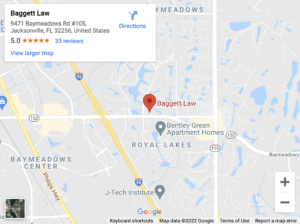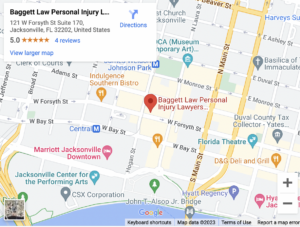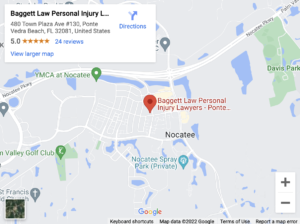
Causation is an element of a negligence claim in personal injury cases. You must prove that the other party caused your injury to recover compensation for damages.
Most personal injury cases are based on negligence, including car accidents, medical malpractice, premises liability, and wrongful death. As part of these cases, you must prove that the defendant’s conduct caused your injury. Proving liability requires creating a chain of causation that incorporates the legal elements of negligence.
The Four Legal Elements of a Negligence Claim

Negligence is failing to act with a level of care that a reasonable person would have used in the same situation. Proving negligence requires having evidence establishing each of the following legal elements:
- The defendant owed the plaintiff a duty of care
- The defendant’s conduct resulted in a breach of that duty of care
- The defendant’s actions by breaching the duty of care were the cause of the plaintiff’s injury
- The plaintiff sustained damages because of the defendant’s breach of duty
It can help to look at a simple example.
Creating a Chain of Causation in a Personal Injury Case
A driver runs a red light and hits your vehicle. You want the driver held liable for your damages. However, the insurance company disputes liability and seeks to limit damages by claiming you contributed to the cause of the accident. Therefore, you file a lawsuit against the driver.
A duty of care exists because all drivers have a duty to follow traffic laws and operate motor vehicles in a manner to avoid accidents. You have traffic camera video showing the driver running the red light and eyewitness testimony that the light was red when the driver entered the intersection.
Therefore, you proved the first two elements of negligence. Now, you must prove causation. Proving causation requires that you:
- Prove the conduct was a direct cause of your injury
- Prove that the conduct was a proximate cause of your injury, i.e., that the risk of harm was a foreseeable result of the conduct
First, we tackle the direct cause. Factual or direct cause asks the “but for” questions. “But for” the defendant’s actions, would you have been injured? The answer in our example would be no.
If the defendant had not run the red light, you would not have been involved in the car crash. Therefore, the defendant’s actions were the direct cause of your injuries.
Next is the proximate cause test, sometimes referred to as the foreseeability test. The defendant must have been able to reasonably foresee that their conduct could result in a risk of harm. For example, a reasonable person could foresee that running a red light could result in a car crash with injuries.
Generally, the law does not hold a person liable for damages for substantial factors they could not foresee or control.
What Damages Can I Recover After Proving Causation in a Personal Injury Case?
Damages refer to economic and non-economic losses. They include, but might not be limited to:
- Expenses and bills for the cost of medical treatment
- Physical pain and suffering
- Loss of income, benefits, and reduced future earning potential
- Disfigurement, impairments, and disabilities
- Mental anguish and emotional distress
- Out-of-pocket expenses
- Reduced qualify of life and loss of enjoyment of life
How much your personal injury claim is worth depends on the facts of your case. The availability of insurance, the severity of your injuries, and disputes related to fault impact the value of an injury claim.
Under Florida’s modified comparative fault laws, your compensation for damages could be reduced or eliminated if you are partially or mostly to blame, respectively, for causing your injury. Therefore, you must be cautious when talking to insurance claims adjusters about the accident. They may twist your statements to support allegations of comparative negligence.
How Long Do I Have to File a Personal Injury Claim for a Jacksonville Accident?
For most personal injury claims in Florida, the statute of limitations for filing lawsuits was recently adjusted. The deadlines are now either two years if your accident happened on or after 3/24/2023, and four years otherwise. While Florida has longer deadlines for filing personal injury lawsuits than some other states, it is not wise to delay contacting an attorney for legal advice.
There are exceptions to the statute of limitations that could apply in your case. Furthermore, the longer you wait to call a lawyer, the more time the other party has to destroy evidence. It could be more difficult to uncover evidence two or three years after an injury.
The sooner you talk with a lawyer, the sooner the lawyer can begin working on getting you the money you deserve for an accident or personal injury claim.




